#contemporary opera and theater
Text

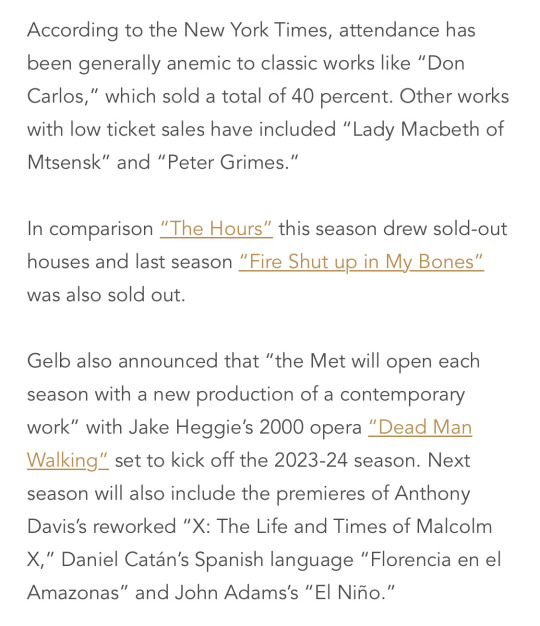

#reggie speaks#like at this point we’re just beating the art form’s corpse#i get wanting to work with a living composer#but the vocal culture of opera is maintained by its core repertoire#it’s not possible to cultivate an operatic voice without the hand of bel canto—the notion of it and the repertoire associated with it#guiding and building voices so that the singer is empowered to tackle any rep they choose#if you can’t put butts in seats for classics maybe you’re not promoting them well#but pivoting towards contemporary works b/c your throwing everything behind them worked (shocker) risks abandoning the form’s identity#and effectively delegates singers to the role of pawns—few contemporary works showcase voices to their fullest extent#‘the hours’ sold well b/c it was headed by three divas—actual stars w/ experience and renown coming together like never before#but renee and joyce wouldn’t be shit w/o mozart strauss and rossini#those composers will be the ones to appear in their obituaries#they’re what made them household names and it was possible b/c the roles showcase the better parts of their vocalism#what does heggie do? other than write listenable non-starters to be performed in conservatories and regional theaters#this move is less about the art form’s evolution and more about how it can be twisted for profit#its spirit being marred matters not if you rig the grammys so you can stack them for better marketing advantage#that your singers have no power and burn out and discarded in less than a decade matters not#and this also absolves the Met of having to fill dramatic roles which can barely be sung anymore#simply write music for smaller voices#and never question why dramatic ones aren’t emerging or why your lyric voices burn out so quickly#god i want peter dissolved in a vat of acid#a record exec being the head of the country’s largest operatic institution was a shit move from the start#and this’ll be his legacy: killing the traditions that have kept the art form extant for hundreds of years for the benefit of his#administration and its allies#how very much like us as a nation and culture
4 notes
·
View notes
Note
would you rather... listen to an opera singer singing pop or a pop singer singing opera?
opera singer doing pop. im sorry but the amount of training you need to make opera even remotely pleasant to listen to. your average pop singer could NEVER
source: i go to music school and am surrounded by both MTs and classical voice students literally everyday
[ask meme]
#no offense but id much rather go see the dept opera than the dept musical#esp if i have to pay for my ticket and the options are fucking. the tender land#or CARRIE#sasha answers#sleepover saturday#ask meme#anon#ty!#also. pedants. i know contemporary musical theater vocal style is different still from pop vocal style. i go to music school#but they're more similar. contemporary theater takes a lot of cues from whatever pop music is en vogue at the time the show was written#usually#also do non opera people know that opera singers dont always sound Like That?
2 notes
·
View notes
Text

Artwork: AH & FB Sync
Taschenopernfestival Salzburg 2023
Ich mag Max Beckmann
Sophie Calle und andere
Pocket Opera Festival Salzburg 2023
I like Max Beckmann
Sophie Calle and others
18. - 21.11.2023
in der SZENE Salzburg
Details to be announced
0 notes
Text



360th Anniversary of Bohun's Death
17.02.1664 Ivan Bohun was executed in the Polish military camp



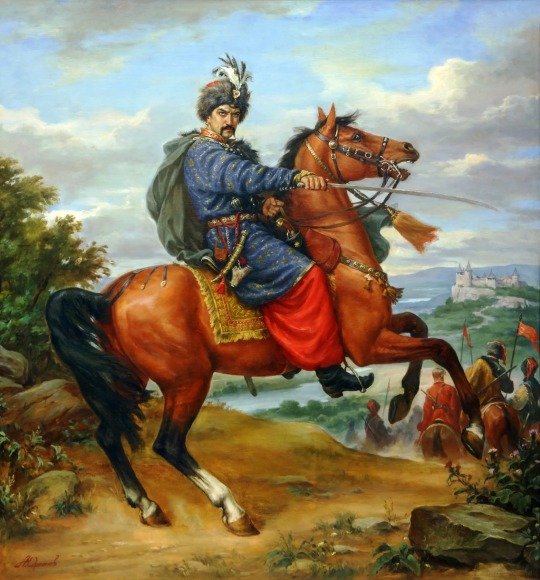
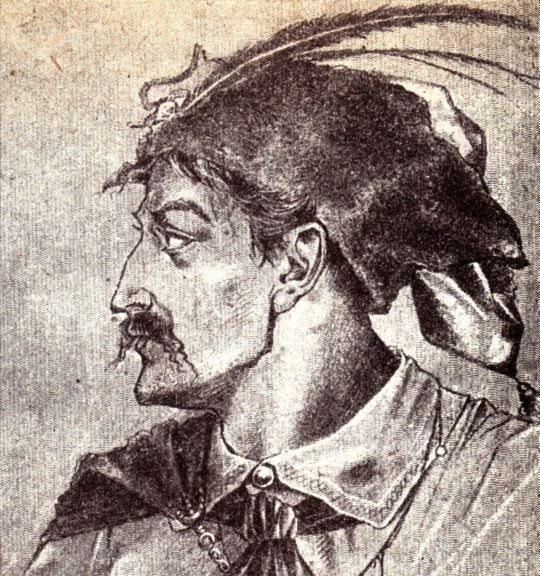
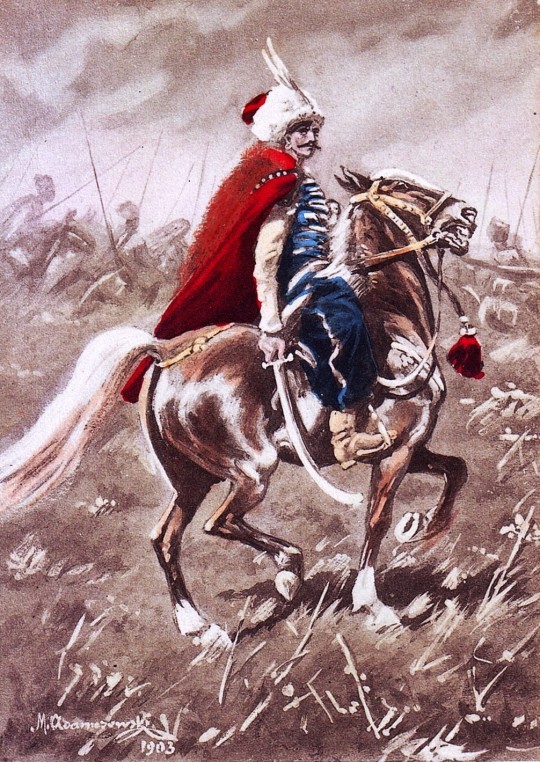

Ivan Bohun (Іван Богун) was a real person, an authentic Ukrainian Cossack hero from the mid-17th century and one of the most important Cossack commanders during the uprising of Bohdan Chmielnicki (Bohdan Khmelnytsky, Богдан Хмельницький), which started in 1648 ('Ukrainian Independence War').
As such, he has many diverse appearances in the Ukrainian culture and in the Polish culture (in literature, folklore, visual arts, music, opera, theater, cinema, etc.). Perhaps, the most famous worldwide (or just Tumblr-wide) of them all is the novel "With Fire and Sword" ("Ogniem i mieczem") by the Polish writer, Henryk Sienkiewicz, from 1883/1884. H. Sienkiewicz changed Bohun's name to Jurko, but described some of his authentic deeds, i.a. the role, he played during the battle of Beresteczko, 1651. The novel itself, as a part of the well-known "Trylogia" (which occupies an important place in the Polish culture), has many adaptations in art, theater, radio and cinema. The most famous of them is the Polish film from 1999, directed by Jerzy Hoffman. So...
Bohun's appearance in that film is not everything, in fact, it is only the tip of the iceberg of Bohun's myth. There is much more to explore and admire.
More information about artworks presented in this post you can find here:
It is a fan&didactic account, existing only for the Cossack Heroes glory and promoting Ukrainian heritage worldwide. Copyright belongs to the Artists/Museums.
#ivan bohun#jurko bohun#ogniem i mieczem#with fire and sword#trylogia#trylogia sienkiewicza#ukrainian history#cossacks#cossack heroes#ukrainian heritage#ukrainian culture#polish culture#ukrainian art#ukrainian literature#polish art#polish literature#trylogia sensem życia
137 notes
·
View notes
Text
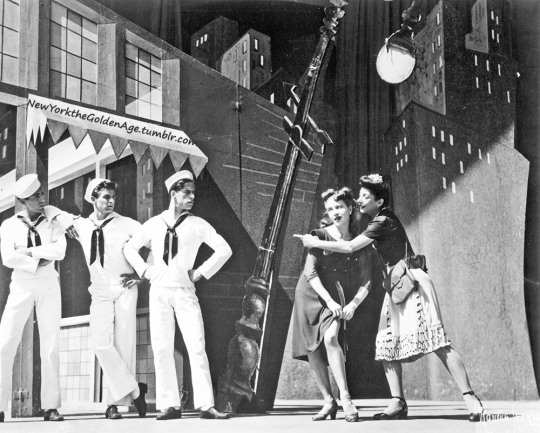
Above: Jerome Robbins, John Kriza, Harold Lang, Janet Reed, and Muriel Bentley in the original production of Robbins's Fancy Free. Photo: Maurice Seymour via Newsweek
On April 18, 1944, Jerome Robbins's first ballet, Fancy Free, premiered at the Metropolitan Opera House.
From the moment the action begins, with the sound of a juke box wailing behind the curtain, the ballet is strictly young wartime America, 1944. The curtain rises on a street corner with a lamp post, a side street bar, and New York skyscrapers pricked out with the crazy pattern of lights, making a dizzying backdrop. Three sailors explode onto the stage. They are on 24-hour shore leave in the city and on the prowl for girls. The tale of how they meet first one, then a second girl, and how they fight over them, lose them, and in the end take off after still a third, is the story of the ballet.
That synopsis was written by Leonard Bernstein, the composer of the ballet's score. He was 25 at the time (the same age as Robbins) and an assistant conductor of the New York Philharmonic. Just a few months earlier, he had made a splash as a last-minute substitution for Bruno Walter at a Philharmonic concert, jump-starting his career.
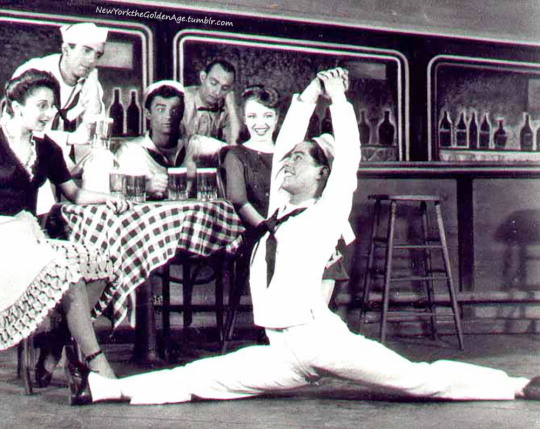
Above: photo from Haglund's Heel
The ballet featured John Kriza, Harold Lang and Jerome Robbins himself as the three sailors, Muriel Bentley, Janet Reed, and Shirley Ecki as the girls, and Rex Cooper as the seen-it-all bartender. The great critic Edwin Denby observed that the ballet:
was so big a hit that the young participants all looked a little dazed as they took their bows. But besides being a smash hit, Fancy Free is a very remarkable comedy piece. ... Its pantomime and its dances are witty, exuberant, and at every moment they feel natural.

Above: Jerome Robbins, Michael Kidd, John Kriza, and Shirley Eckl performing the ballet in London Photo: Baron via MPR News
Over the years, Fancy Free has entered the repertory of countless ballet companies in the U.S. and abroad. It was so popular that Robbins and Bernstein were persuaded to turn it into a Broadway musical: On the Town. It debuted on December 28 of the same year, which seems astonishing considering how long it takes to create contemporary musicals. Bernstein wrote the music, Betty Comden and Adolph Green the book and lyrics, and Robbins choreographed it—the first in a long line of musical theater triumphs for him. Confidence in the show was so high that MGM bought the film rights before it opened, a common practice now, but not then. It was the first film set in the city to be actually filmed there (in part) instead of on a Hollywood soundstage.
#vintage New York#1940s#Fancy Free#Jerome Robbins#ballet#Leonard Bernstein#American ballet#John Kriza#Harold Lang#Muriel Bentley#Janet Reed#Shirley Eckl
40 notes
·
View notes
Text
The myth of Medea (3)
After this previous article about Medea by the Renaissance, I offer you another loose translation – of Michèle Dancourt’s article about « Medea in the European culture of the 20th century ».
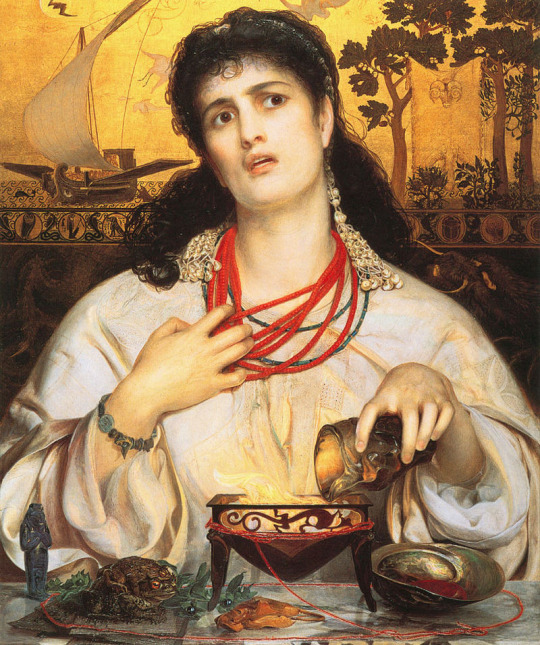
It seems that, within the myth of the infanticide, Medea’s male counterpart is Herakles, who killed his wife and children under the illusion that he was sacrificing animals. Heiner Müller highlighted how Medea became one of the great figures of the 20th century and one of the symbols of the disasters that struck it, alongside Herakles. (Meanwhile the 19th century was more fascinated and devoted to the duo of Antigone and Prometheus). When he staged his work “Cement” in 1972, depicting the monstrous metamorphoses caused by the Russian revolution, Heiner Müller slid in both an “Herakles 2 or the Hydra”, and a “Medea-Commentary”, to better show the “war of the texts” around the character of the child-killer. He said: “Myths are a collective experience that repeats itself. We can make them variate up to infinity, just like dreams.” During the 20th century, Europe modulates the figure of Medea, reinvented from the texts of Euripides and Seneca, in the theater, in the opera and in the cinema. These variations are all the product of male artists, except for a few attempts in different medium: choreography (with Martha Graham and Birgit Cullberg), essay (Isabelle Stengers), novel (Christa Wolf) – almost as if the radicalization of Medea’s monstruosity finally called for women’s voices to speak after centuries of male creation.

1/ Fable variations
The Medeas of the 20th century all edit and nuance the original legend. Jean Vauthier’s partition created for the play of Seneca develops and expands the subject (with the music that Xenakis composed for this show being very insistent on the original Latin inflexions), while the “Medeaspiel” of Heiner Müller is very contracted between the choral of the two sides, “Abandoned shore” and “Landscape with the Argonauts”. Close or far away from the texts of Antiquity, all those contemporary rewrites offer new insights on the character. For example, they shift the focus towards a Medea still deeply rooted in Colchis: Pasolini’s movie opens, with Cappadocian landscapes and Tibetan music, on a mysterious sequence depicting archaic agrarian rites and sacrifices where Medea performs as a priestess. In the sardonic and misogynic play by Gilbert Lely, “Only kill your father for good use”, Medea, depicted as a parricide and as involved in an incestuous relationship with her brother, cannot even leave Colchis: Jason rejects her and escapes while she is having a breakdown.
Other works prefer to move the tragic emotion towards the children of Medea and Jason, who were barely heard in the centuries past. Hans Henny Jahnn’s “Medea” presents two sons with a strong bond, a weapon that Medea will use to “nail down this beautiful couple”. The play highlight the cruelty of the impossible rivalry between Jason and his oldest son, who both are in love with the daughter of king Creon. Medea, indeed, gave to his lover in this version an eternal youth. Similarly, when Lars von Trier shoots in 1988 the scenario that Carl Dreyer wrote in 1965, and where Medea poisons her children with a sweet tisane while singing a lullaby, he invents a new pathetic sequence: the oldest son helps his mother to hang the youngest one on the branch of a tree, in a wasteland, and after waiting for a long time he finally asks his mother to help him make his own noose.
However, the works of the 20th century get the further away from the tradition when it comes to the endings. While Medea stills takes refuge at the Athens of Aegeus (as in Euripides), no work ever present the “epiphany of the crime in a triumphal chariot” (as with Seneca), a scene which had been a rule for the classical theater and opera. The idea of Medea going “upwards” is simply suggested, sublimed: the Medea of Bergamin calls for the Celestial Father, “I will fill your eternal solitude with a human solitude of love!”. Outside of Anouilh’s Medea, who kills herself, the Medeas of the 20th century all disappear without dying because, as Max Rouquette wrote “how can one die when we are but a kind of death, a cursed wind which haunts endlessly the earth”. The Medea of Kyrklund petrifies herself in the shape of the Minoan snake-goddess, with Jason by her side, “like an engraving on a funeral stone”. The one of Jahnn, sitting by the corpses of her children, announces the end with her prophetic voice: the fortress will crumble down to the bottom of the sea.

2/ Paroxysm of violence
It is through modern singing that Medea now tries to capture the “furor” of Antiquity and the “panic” energy which infects the entire city. Christa Wolf’s “Medea-Stimmen” depicts the mechanism of how a scapegoat is created by a chain reaction: Medea is insulted in the streets of Corinth and treated like a scapegoat, she is banished from the town, her children are lapidated by the crowd, and the collectivity ends up inventing the legend of the infanticide after the one of the fratricide. To express the excess of this “spiritual disaster” (as Pasolini said), of this undepictable crime, all the tensions go through the sounds, from Pasolini’s deafening silences to the stenographical screams of Jean Vauthier. The scream is a recurring didascaly in Anouilh’s “Medea” where the protagonist makes an effort to become the Fury that Creon sees in her: “Beasts of this night! […] I shout with you your dark scream. On this night, Medea is all that hunts and all that kills.” Heiner Müller’s Medea echoes in her monologue the screams of many more victims, those of Colchis colonized, of her children that she murdered, of her rival which she mimics the agony of: “Here she is screaming / Do you have ears for this scream / And so screamed Colchis when you were in my womb / She’s still screaming / Do you have ears for this scream”.
All the voices of this echo chamber scream of life and death. Max Rouquette’s Medea screams to an old woman “Shut up! I should not have allowed you to speak. You offer your tongue to the voice of my belly which begs me to save them.” In this this game of hyper-intensity, there is a physical dimension to the passion, which keeps involving in all of these works the blood, the heart, the entrails, the belly, all tied to the notion of devouring. Heiner Müller’s Medea screams “Does this body not / Mean anything to you anymore / Do you want to drink my blood, Jason?”. To her children she says: “I want to rip you out of my heart / You who are the flesh of my heart / My memory / My darlings / The blood in your veins, give it back to me / Enter again my body, for you are entrails”. When she kills her sons, Jahnn’s Medea dares to say: “My thick blood has no shame in laughing, / drunk with vertigo, / because my eyes saw the fruit / of my entrails”. The same characters describes with horrible details how she cut into pieces the body of her brother. She listens to Jason, but only to her him begging her to mutilate him organ after organ, or to listen to how his new wife turned into a carrion.

3/ Medea the barbarian
These explosions of violence are all concentrated within the words “monster”, “savage”, “barbarian”. Sometimes it is Creon that uses them against Medea: “You are a beast! A non-Greek Barbarian! Your work is as black as your skin!” (Jahnn). Other times it is Medea herself that uses the word: “Why are you still clinging on to this barbarian / Who is your mother and your mark of shame” (Müller). “Medea the barbarian” is a notion that comes first, replacing the old idea of Medea the sorceress that Corneille’s play or Charpentier’s opera favorized. Medea becomes the character throughout which the notion of “barbarity” is reversed and decentralized. The artists of the 20th century turn Medea into the “strange foreigner”, robbed of her identity and who can only regain it through an enormous crisis. For Anouilh, Bergamin and Rouquette she is a Gypsy woman, for Jahnn she is a cultureless African, and with Kyrklund’ “Medea Foreigner” she forces the characters to see and hear everything that the European colonization vanquished and repressed: “This vision, Jason / That with the boots of your troops you painted all over my Colchis” (Müller). Kyrklund’s Medea, when she talks about the tree of her native land, the m”bongo”, defends strongly the notion of “sacred” and she fully understands the emptiness of the utilitarian rationalism of which Jason is so proud of. A same conflict is developed by the episode of the “mythical Centaur” in Pasolini’s movie, with Chiron educating a child Jason. Once adult, impoverished by both the colonial adventure of the Argonauts and the male culture of the “logos” at the heart of the city of Corinth, Jason loses any access to the poetry of the hybrid, to the unicity between man, animal and god. When he hears the “rational Centaur” talk and thus verifies the disenchantment of the world, he goes away crying, one hand before his eyes. “Medeaspiel” takes place in a set called “Abandoned shore”, a tormented earth after the last battle of World War II, an atrocious trace left by a male predator that was drunk with the might of his murderous technology. The nature has been torn apart just like the woman was forced to flee, and Medea in her distress knows a “reverse conversion” as she loses her sense of the mystery. The modern works thus invoke back the colonial denunciation present within Euripides and Seneca, but it isn’t just a battle between Europe and Asia anymore.
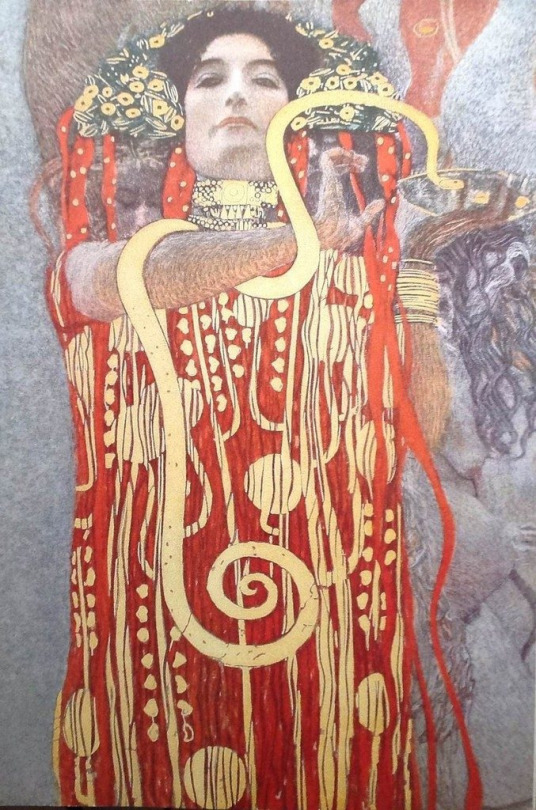
4/ The gender war
The knot of violence binds together the bursts of History with the sexual antagonism, because the Greek man betrayed the foreign woman and her children. Numerous texts create a duel where each repeats with a hateful obsession the theme of the “mine and yours”: “I come to give you what belongs to you, and ask you what is mine.” “Who are you fleeing, Jason, you or I? My sons or yours? Your blood or mine?” (Bergamin). “All within me is an instrument all for you. / For you I killed and I gave birth. / Me, your bitch, your whore, me.” (Müller) In this hateful lists that closes the suicidal infanticide, Müller’s Medea can only conclude with this position: “I want to rip humanity in half / And stay in the void between. Me / Neither woman nor man.” The Medeas of Gilbert Lely and Anouilh, the only ones who are vanquished, turn against themselves an irrational hatred of the wounded and amputated feminity. But the feminist cry that can be heard in Euripides’ Medea is still maintained by the works of Dreyer, Lars von Trier, Kyrklund or Bergamin: “I do not want to see the hand of man stop the power of my soul”. “Medea la encantadora” gives a unique light to the dialogue Medea has with her rival Creusa: the word of Medea, “the soul’s weaving”, initiates her to a hidden knowledge, her incantations are tied to the “cante jondo” where a male and female singer oppose each other in a new take on the old chorus. Indeed, in the modern works the chorus is always transformed: for Kyrklund the bourgeoisie of Corinth, for Max Rouquette old women who sing psalms with the voice of magpies, for Müller anonymous and apocalyptic voices… But in very case it amplifies the tragic song of Medea, who keeps modulating her own name (Medea nunc sum), since, by Anouilh’s words, “mothers will never call their daughter by this name anymore”. As with the other Medeas, the one of Max Rouquette plays with the numen of her name:
“You are the image of Medea. You are my mirrors… / More beautiful than any of those that were given to you. Of Medea no image can be ever be bound. / No image of Medea to pay the happiness of another. Be sold who wants to. / But not Medea. Nor Medea’s flesh. / Nor Medea’s love can be separated from Medea.”
17 notes
·
View notes
Text
Whenever I see a mid ass ballet or opera season in the theaters I see productions at, all I can think is wtf are billionaires doing. Like if I had that much money and I were selfish enough to not care about anything but my own entertainment I would spend all my time and money paying theaters to put on my favorite ballet and opera productions. Like fuck putting on Barber of Seville for the millionth year in a row and get some Samson et Dalila in this bitch. Fuck this weak ass 2 hour contemporary ballet bullshit with 3 intermissions as long as the pieces themselves and bring back full-on 4 act 4 hour traditional ballets. And so on
#today on me sounding like a boomer lol#like can we please get a traditional classical ballet in here for once#contemporary ballets are cool but like i haven’t been able to see a live traditional ballet performance that wasn’t fucking nutcracker#in years#stop doing anna karenina and put on a production of romeo and juliet or something#please my crops are dying#ballet#opera#moonie posting
11 notes
·
View notes
Note
as i research into stuff for my jewish faust meta, i find there's a lot to unpack with mephistopheles originally being a demon from german folklore in the main legend. (in my retelling, we're not all that sure what mephi is to begin with, an allusion to satan/hasatan from "the book of job" simply translating to "the adversary" from hebrew. we just know that he sure as hell isn't human :])
in goethe's version, he comes much more off as a hasatan - the adversary - type from "the book of job". i think it's something about his very cavalier "hey, g-d, if i managed to corrupt this heinrich faust guy would that be fucked up or what :D" energy. marlowe's take on mephi bears similarities to lucifer with all of the internal conflict and insight we get into his character, though we don't get that same insight with goethe's. i love goethe's mephistopheles (as you can tell), but i think that a lot about his character motivations come off as a lot more ambiguous and we don't really get as much insight into who he is.
maybe this facet of how mephi's portrayed deserves an entire meta or analysis post of its own, though i find that the figures of satan and lucifer in more contemporary portrayals of the devil archetype tend to overlap as the same character. and maybe goethe was going for that, but i haven't really done much research into goethe's personal views on religion yet, nor have i read much of his other work.
Oh, Goethe's Mephistopheles is definitely a Job-like figure--that's one of the reasons I saw your Jewish Faust take and went "yeah, I could see that!" Goethe was not conventionally religious at all and may have been more of a deist or atheist, iirc--Faust uses Christian iconography for its conception of the universe but ascribes a lot of different meanings to it. There's a bit of a pop-cultural tendency to just read Mephistopheles as another name for "the devil" but if he's "the devil" he's the devil of another cosmography rather than just straight-up being the Christian devil, I think. More generally I do think it's important that Mephistopheles is inextricably tied to the Faust legend--it's worth noting that in the earliest references his name is spelled Mephostophiles, which basically parses to "not loving light" in Greek, but if you say it aloud with that pronunciation you can probably discern the wordplay, with Faust's name embedded in that of his demon. Insofar as he can be detached from it I think he's a very personal demon more so than the universal enemy of humanity implied by the idea of the Christian devil.
(As a side note, you should definitely check out Boito's opera Mefistofele, which is the only operatic version to include Mephistopheles' wager with Upstairs, although the divine voice is represented by the chorus because there's some stuff that's kinda hard to pull off in opera. The aria he has about how he just isn't having any fun these days because humans are corrupt enough without him is delightful--in general I think you'd like it, though, it's really good and all of the title character's arias serve incredible amounts of cunt. I'll finish this post and then I'll dig up a video of that first aria for you)
This ask also got me thinking, because you mention that Marlowe's Mephistopheles "bears similarities to Lucifer" -- I can't actually think of any tortured demon figures in literature that predate him. Dante's Satan doesn't even seem sapient, and devil characters in medieval drama tend to be slapstick figures. Of course the trope codifier for the tormented and even somewhat sympathetic Satan/Lucifer is Milton's Paradise Lost (although Milton is a devout Christian and consistently undermines the reader's sympathy) but Milton, despite his Puritanism, was a theater fan and draws on Marlowe's Mephistopheles for his characterization ("which way I fly is hell, myself am hell" definitely owes something to "why, this is hell, nor am I out of it"). Is Mephistopheles the trope codifier for putting the emo in demon? I think he might be!
(But it is, of course, important that in Doctor Faustus and its source material Lucifer is a separate character--when Faustus tries to strike his deal the first thing Mephistopheles says is basically "lemme ask my boss." Later on he shows up in person to put the fear of himself into Faustus. Since it's a play where the question of whether Faustus has free will hangs over the whole thing, it's important to Mephistopheles' function as a dramatic foil that he pretty manifestly does not. He may not even want to damn Faustus but that's immaterial, he's along for the ride anyway)
#doctor faustus#i need a dedicated goethe faust tag#good points all around#hot faust summer#mephistopheles#not quite mephistopheles monday tho#there are too many parentheticals in this reply
9 notes
·
View notes
Note
I'm curious, if the cast have any hobbies they do in their free time or to relax?
(The world is too chaotic, hope they all have a peaceful day😔)
Thank you so much for sending this, the crew definitely needs those moments of relaxation and fun…
Locke loves playing his viola, playing music is very therapeutic for him, releasing the tension and giving voice to the emotions it is so very hard for him to speak about. Like the violin it’s an instrument that elicits haunting sounds and sadness, but it’s darker and richer in tone. He gets so ticked off when people mistake it for a violin.
He likes reading nonfiction books, with the exception of a few novels, and also enjoys attending concerts where he can close his eyes and sink into the music like water…but because his work is so important to him, he doesn’t really make time for himself to do such things.
Once upon a time, he loved playing chess with Regal.
Regal plays the piano, a versatile instrument adept at both classic and contemporary music. Playing is very therapeutic for him, releasing tension and turmoil and allowing him a way to “speak” to the emotions so many would be horrified by.
He loves to read a variety of different things, nonfiction and novels and plays and poetry and essays, and enjoys attending the theater as well. However, due to his work, he’s very busy and hasn’t had much time to himself.
Once upon a time, he loved playing chess with Locke.
Sorcha adores reading, and her absolute favorite book is “The Phantom of the Opera” - she’s very proud to have a first edition in her personal library! She is very much a patron of the arts in general, always looking for new art galleries and museums to explore, theaters and shows to attend. She also loves being wealthy enough to be able to shop at high fashion stores for all sorts of treasures to adorn herself with, and all the owners are thrilled that a beauty like her wears their wares…
Lorcan’s biggest passion is boxing, he’s an absolute legend in the ring and loves to lose himself in a good match, facing off with a worthy opponent. He also loves swimming as well but doesn’t get to do it too much, which is a shame as it really helps with his aches and pains. For quieter moments he likes to whittle and play cards.
Rilla’s biggest passion is dancing, a love that her mother passed onto her, it is her joy and her escape from whatever weighs her down. She also LOVES designing and sketching dresses and clothing, and would love to bring her creations to life but she’s never been able to find someone to teach her how to sew. She also is known in her social circle to be a dab hand at crafting some stunning flower crowns.
Lu loves to write, especially stories about magic and fantasy and girls finding themselves through challenges. She visits the library and bookshops whenever she can. She also enjoys watercolors, especially landscapes and flowers.
Brig was taught to box by her father and she’s been a devoted boxer ever since, and is an absolute beast in the ring. She finds working out to be very relaxing as well, a good way to center herself and enjoy the burn of her body.
Bogdan loves composing music, he’s very talented and likes to take his inspiration from the natural world. He’s also avid about charting the stars, and spends much of his time studying the skies.
Casimir will actually be gaining a hobby in the comic! But as for right now, he loves playing cards and gambling, especially when the stakes are high…
Clifford likes good old fashioned English hunting, shooting after crickets and beetles and birds (they aren’t sentient in this world).
Thank you again for sending this! As we introduce more characters I’m gonna come back to this post and reblog it with their favorite hobbies, this was a wonderful character exploration exercise. And it doesn’t even touch on what the couples like to do together…
#ratterrock replies#ratterrock#ratterrock trivia#ratterrock character information#sage locke#padraic regal#sorcha regal#lorcan regal#bogdan nightshade#casimir nightshade#rilla mackenzie#luella woodmouse#brig o’ broin#inspector clifford#original characters
11 notes
·
View notes
Text
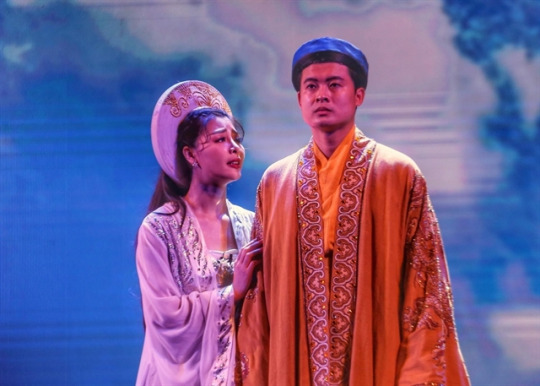
Traditional Vietnamese Theatre
The offspring of Chinese Opera, different forms of traditional Vietnamese theatre have flourished over the years, each with their own unique flavour. The major genres of theatre in Vietnam are:
1. Hát Tuong or "hát boi"

Theatre Actors of Vietnam in Early Times
Often called 'classical Vietnamese opera', Hat Boi was imported from China and performed for royalty as far back as the 13th century. The theme of the play was usually on important aspects of Vietnamese culture, with the plot centred around decorum and history, using easily recognizable stock characters with elaborate make-up and costumes. An improvised form of imperial court music Nhac Tai Tu accompanied the play.
2. Cai luong

A more popular form of theatre in Vietnam than Hat Tuong, Cai Luong has been one of the most adaptable forms of theatre. It was based on contemporary themes and incorporated modern elements such as an electric guitar into it, while the singing that accompanied the play was high on vibrato. However, since the 1970s and 80s, the popularity of Cai Luong has declined rapidly, and it now sustains itself mostly on state funding.
4. Múa roi nuoc (Water Puppetry)

Water Puppetry, a unique form of theater originating from Vietnam
Better known as water puppetry, this is the quintessential form of Vietnamese theatre that attracts hordes of tourists every year. Puppeteers are hidden behind a split-bamboo screen and use long poles hidden under the water to control the puppets. Developed in North Vietnam, water puppetry is one of the most popular aspects of Vietnamese culture worldwide as it is an art form unique to the country.
Nowadays, Vietnamese theatre has become more diverse and welcomed modern styles, making use of acrobatics, props and optical illusions. The best places to catch water puppet shows are at the Thang Long Water Puppet Theater in Hanoi and the Golden Dragon Water Puppetry Theatre in Ho Chi Minh City, while the majestic Saigon Opera House is your go-to destination for all other kinds of live shows
17 notes
·
View notes
Note
Barbatos 🌂
Okay so forgive me because all I could think of when I saw this was how much Barbatos probably enjoys the musical Singin' in the Rain. I feel like he secretly (not so secretly?) is a huge broadway/live theater fan. He certainly has memorized the main dance number.
So I'm using this as an excuse to do an entirely indulgent Bros + Extras HC post:
What is their favorite musical?
Lucifer: Les Misérables. Happy endings where? He appreciates the nuanced plot and relates to all the bullshit the leads have to deal with. He gets teary at the end but will never let a soul see. Except perhaps you. Perhaps.
Mammon: Newsies. A bunch of scrappy up start business boys coming together to demand some extra coin for their hard work? What’s not to like? I mean, if you asked him he’d deny enjoying musicals at all, but we’ve all heard him singing the lyrics under his breath.
Leviathan: Six. History but turned into an idol concert? His dream. For a period he got way into learning everything there was to know about Henry VIII’s six wives and he and Satan were insufferable, spouting facts to anyone who would listen.
Satan: Phantom of the Opera. A classic, and for a reason. He admires the impact it had on contemporary theater and he claims to relate to the Phantom…but you know better. Once he admitted to you that his real favorite was Wicked, and you suspect he sees himself in Elphaba more than he may be ready to admit.
Asmodeus: Chicago, of course. Razzle Dazzle? When You’re Good to Mama? CELL BLOCK TANGO? This is the most Asmo-coded musical to ever grace the stage. You know he’s just WAITING for the excuse to force his brothers to dress up and perform with him. He'd be satisfied if you'd settle for a private performance as well.
Beelzebub: Beel has a hard time with live theater, because it’s a long time to sit without any concessions to get him through. Watching a performance on TV or as a movie though he’s happy with. His personal favorite is Peter Pan. He likes the Lost Boys the best, a group of brothers all happy together (and Wendy too of course). Also, he knows it doesn't count...but that food scene in Hook? Nice.
Belphegor: Heathers. What can he say, he likes the bitchiness. Also he always thought J.D kinda had a point. He likes to imagine that he and Veronica blow up the school and run away together to live happily ever after in a sort of a twisted Bonnie and Clyde way. Anyway, how about those uniforms? Any chance of you wearing one of those sometime ha ha…?
Diavolo: The Lion King. Oh man oh man Diavolo loves The Lion King. Does he frequently tease Barbatos (and sometimes Lucifer) about being his Zazu? Absolutely. Was Nala his first not-so-secret crush? Oh yes. Does he wish he had a dad like Mufasa? …Well, let’s not worry about that. Diavolo loves every minute of the play, but he openly weeps at the end when Simba takes his place as king.
Barbatos: Singin’ in the Rain. The classic aesthetic, themes of struggling with adjustment in a changing world, a triumphant ending...it's a bit of an escapism pleasure for Barbatos. Not to mention, he's happy for any excuse to dress up and go out on the town with you on his arm.
Solomon: Moulin Rouge. Solomon is a romantic at heart, but he’s a romantic who knows that all too often, romances are tragedies wearing a mask. He enjoys indulging in the sweetness of the love story, the hopeful crescendo, before the fall into the reality of loss. He finds it depressing in a comforting way, like an old friend waving hello from across the street. As time with you goes on however, he finds it’s becoming harder to watch through to the end…Perhaps Beauty and the Beast is more to his new tastes?
Simeon: Waitress. Simeon, like Lucifer and Solomon, enjoys the bittersweetness. He likes that it doesn’t shy away from the messiness of human connection. As an angel, it’s fascinating, like a fruit he can never know the flavor of. However, unlike the other men, Simeon likes a happy ending, and the ending of Waitress makes him choke up for different reasons. If Luke asks, however, his favorite is Matilda.
Luke: Annie. Little kids being rascals and naughty with the sweetness of a tender adoption story? It makes him feel warm and fuzzy (and mischievous) every time. Knows all the words to every song though he won’t admit it in front of Mammon.
#I SPENT WAY TOO LONG ON THIS#obey me#obey me hcs#blithe hcs#obey me solomon#obey me leviathan#obey me satan#obey me beelzebub#obey me lucifer#obey me mammon#obey me asmodeus#obey me barbatos#obey me simeon#obey me diavolo
30 notes
·
View notes
Text
I. Me. You?
The pocket opera festival Salzburg 2023 looks behind the scenes of self-portrayal.
And in the process spans a century that has seen it all. From Max Beckmann to Sophie Calle to the present TikTok-era. Transformed into sounds by Julia Míhaly, Oxana Omelchuk, Alvaro Carlevaro, Bernhard Gander, and Stephan Winkler. Musically conducted by Peter Rundel, staged by Thierry Bruehl, lit by Hubert Schwaiger. The oenm - Austrian Ensemble for New Music plays.
I like Max Beckmann, Sophie Calle and others
is the title of the tenth Salzburg Pocket Opera Festival 2023. Behind these two names, two differently famous artists come out, for whom the encirclement of an identity has become a life theme in different ways.
In Beckmann's case, it is about questioning one's own identity through self-portraits that are often broken, but at least unvarnished, revealing and exposing oneself, about looking in the mirror.
In the case of the French conceptual artist Sophie Calle, it is about the radical "exposure" of a person unknown to her, whose lost address book, found by her somewhere in Paris, she uses as the basis for tracking down the unsuspecting man at her mercy by questioning the addressees. This indiscreet documentation, which Sophie Calle interpreted as an art action and which was eventually published in the daily newspaper Liberation, caused a tangible scandal in the 1980s that still reverberates today.
Julia Mihály, Oxana Omelchuk, Alvaro Carlevaro, Bernhard Gander, and Stephan Winkler have been commissioned to deal with this thematic field. In an "irritable" and militantly highly sensitive present that oscillates in the contradiction between attentiveness and preservation of one's own identity and at the same time lustful media omnipresence of one's own meaning, the artistic director of the festival and stage director Thierry Bruehl, the musical director Peter Rundel and the dramaturge Hans-Peter Jahn hope for five highly different perspectives on the discrepancies between private being and staged appearance.
Klang21 will present the world premieres at the Salzburg Pocket Opera Festival on 18 November 2023 at SZENE Theater Salzburg.
Ich. Mich. Dich?
Das Taschenopernfestival Salzburg 2023 schaut hinter die Kulissen der Selbst-Darstellung. Und spannt dabei den Bogen über ein Jahrhundert, das es in sich hat. Von Max Beckmann über Sophie Calle bis in die TikTok-Gegenwart.
Ich mag Max Beckmann, Sophie Calle und andere
lautet der Titel für das zehnte Taschenopernfestival Salzburg 2023. Hinter diesen beiden Namen outen sich zwei unterschiedlich berühmte Künstler, denen die Einkreisung einer Identität auf unterschiedliche Weise zum Lebensthema geworden ist.
Bei Beckmann geht es um die Hinterfragung der eigenen Identität durch vielfach gebrochene, zumindest jedoch ungeschminkt sich selbst preisgebende und aufdeckende Selbstbildnisse, um den Blick in den Spiegel.
Bei der französischen Konzeptkünstlerin Sophie Calle um die radikale "Bloßstellung" eines ihr unbekannten Menschen, dessen verlorenes und von ihr irgendwo in Paris gefundenes Adressbuch sie zur Grundlage macht, dem ahnungslosen und ihr ausgelieferten Mann durch Befragungen der Adressaten auf die Spur zu kommen. Diese für Sophie Calle als Kunstaktion gedeutete und schließlich in der Tageszeitung Liberation veröffentlichte indiskrete Dokumentation sorgte in den 1980er Jahren für einen handfesten Skandal, der bis heute nachhallt.
Julia Mihály, Oxana Omelchuk, Alvaro Carlevaro, Bernhard Gander und Stephan Winkler sind beauftragt worden, sich mit diesem Themenfeld auseinanderzusetzen. In "reizbarer" und militant hochempfindsamer Gegenwart, die im Widerspruch zwischen Achtsamkeit und Wahrung eigener Identität und zugleich lustvoller medialer Omnipräsenz eigener Bedeutung pendelt, erhoffen sich der künstlerische Leiter des Festivals und Regisseur Thierry Bruehl, der musikalische Leiter Peter Rundel und der Dramaturg Hans-Peter Jahn fünf höchst unterschiedliche Perspektiven auf die Diskrepanzen zwischen privatem Sein und inszeniertem Schein.
Klang21 wird die Uraufführungen beim Taschenopernfestival Salzburg am 18. November 2023 im SZENE Theater Salzburg präsentieren.
#taschenoper#taschenopernfestival#contemporary music#pocket opera#festival#salzburg#music theater#klang21
0 notes
Text
tap tap tap. is this thing on?
hi hi! it feels so weird to be posting on here after lurking. after forever dwelling in the cesspits of this app, i've finally decided to make an attempt at making some friends! especially ones into the same things as me.
a little bit about myself. my name is everette, i use he/she/it, and I'm a lesbian! i also answer to eve and evie! if it wasn't incredibly obvious, i have autism, and my hyperfixation just so happens to be everyone's favorite silly band: ghost <3
tags i plan on using :
#eve masterlist (all of my posts, archived.)
#eve makes (sims 4 content)
#eve ghosts (ghost content)
#eve rambles (unorganized, miscellaneous rambles)
#eve writes (prompts, ficlets, headcanons, anything i decide to write)
#eve answers (!! exactly what it says! i answer!!)
more may be added!
my interests ; ghost, the magnus protocol & archive, i have no mouth and i must scream, contemporary horror lit, j.c leyendecker, arcane, bg3, dbh, saw, debate, web design, the romantics, chappell roan, the romantics, ethel cain, tyler the creator, musical theater, especially cats and phantom of the opera. definitely more, but those are the basics!!
this is also an official call for literally any ghost fans. i desperately need more friends into ghost. being into a 'satanic' swedish rock band in the deep south is hard, y'all :(.
<3
#intro post#blog intro#the band ghost#ghost bc#writers#friendship#looking for friends#mutuals#looking for moots#tobias forge#nameless ghouls#eve masterlist
19 notes
·
View notes
Text
Stage Evangelion Beyond

Stage Evangelion Beyond (舞台・エヴァンゲリオン ビヨンド) is an original theatrical adaptation of the Evangelion franchise that will take place in Japan during the months of May and June 2023.
The original idea, composition, direction and choreography of this work are by Sidi Larbi Cherkaoui, a world-renowned choreographic genius widely active in directing and choreographing not only theater and contemporary dance performances, but also ballet, opera and operas. Masataka Kubota, a talented actor who has appeared in numerous dramas, films and theatrical productions, plays the title role, and the splendid cast includes Shizuka Ishibashi, Mizuo Itagaki, Takato Nagata, Akane Sakanoue, Kanna Murata, Kyoko Miyashita and Tetsushi Tanaka. The splendid cast and crew will bring to life a new "Evangelion" that no one has experienced before.
Stage Evangelion Beyond
25 notes
·
View notes
Note
Nadia. I need to know—have you seen Chitty Chitty Bang Bang?
And as a trained singer who is brilliantly skilled with the gift of music, I would like your thoughts. 🤟😘🫶❤️🔥


Yes, I have!
In all honesty, I haven’t seen it in many, many years, but this was a childhood favorite musical of mine, along with Phantom of the Opera and Evita!
I had to watch some clips from YouTube to refresh my memory of the singing, and I have to say that of the main cast, the one with the best voice was Sally Ann Howes, who played Truly Scrumptious.
She sang with an old-fashioned musical theater style, that lofted semi-classical music approach, and a Trans-Atlantic accent, without being heavy and overdone, and it was just beautiful.
The children, Jeremy and Jemima, played by Adrian Hall and Heather Ripley, respectively, sang with beautiful, clear, children’s voices.
It walked that fine line between vocally over-trained and trained enough.
You see, training children to sing, is a very, very delicate task.
Because children have many, many physiological limitations to what they can do safely.
Because, if you make the mistake of overly training a young voice, you run the risk of them never being able to sing again when they’re older.
However, there are some rare exceptions, the one percent you can take just that much further (full disclosure, I was part of that one percent, so I know), but this takes very detailed knowledge of the overall limitations of a child’s voice, and the limitations of your particular student.
The best thing you can do for a child student is to let their voice be that of a child’s; more technique can come later.
Now, as for Dick Van Dyke…
…yes, he can sing, but his voice is not the most melodic voice in the world.
His singing somewhat belongs to the, as I and my family call it, Rex Harrison school of singing—ergo, speaking on pitch.
The main example of this is in the song, “Hushabye Mountain”, which is one of my favorites in the whole movie.
Compare the way Dick Van Dyke sings it to the way one of my favorite Broadway performers, Raul Esparza, sings it.
youtube
youtube
If he looks familiar, it’s because he played Rafael Barba on Law and Order: Special Victims Unit.
(You have to listen to his rendition of Sondheim’s “Being Alive” from Company, it’s ART)
There is a vast and marked difference in the way it’s sung.
Yes, he sings it in a more contemporary musical theater style, but the melodic line is more fluid and musical.
There is absolutely no doubt that Dick Van Dyke can sing and dance, and he’s a darned Legend, capital L, but I am very sorry to say; I think that vocally, Raul Esparza did a better job.
I know it might be controversial, and a great deal of people may come at me, but my honest opinion was asked, and this is it.
I’m so sorry!!
*runs off to hide under a rock*
14 notes
·
View notes
Note
oooohhh now u got me curious. how do you think an alarkling mentor/protégée focused dynamic a theater au would hypothetically go??
I'd probably just take heavily from a phantom of the opera esque relationship trajectory. though I think vanity or at least pride along with like hard power within the scope of the story is important enough to the darkling's character function that I wouldn't make it an outright poto au where he's like hideous and hiding in the walls lmfao.
so he's probably like the artistic director of a theater company, maybe as a retired celebrated performer himself, and she's his favored up and coming actor. (for gothic value and bc there are no powers and I need something to keep me entertained I'd say like Something Happened and he stopped performing and it's a mysterious thing he's broody about. but that's not integral, I just like drama.) the first book already has like the contemporary vibes of a teacher/mentor/someone in power having bad boundaries with underlings despite the trappings of like a fantasy army. so translating that dynamic would be fairly easy, and it'd be simple to just lean into it more, where there's simply a longer period where alina is under his sway and more invested for it.
he's likely exacting, again very bad with boundaries lol lmao, and promises her a lot but very conditionally. I'd also highlight the zoya rivalry in this, where she was the former favorite until alina showed up, and translate that into him actively pitting the performers against each other. and alina probably starts out some level of starstruck and apprehensive of like dfgh the red flags but keeps getting in deeper and deeper.
something interesting about any sort of professional arts is that it’s SO competitive and alina particularly has like zero ambition. so tho I could see her getting into theater out of an initial genuine interest in it, to an extent, her wanting to like be the best or to just stay in the game on a career level feels like it would probably stem from wanting to keep his favor.
but yeah overall trajectory, I'd probably have some sort of phantom esque thing where she does start to make it big and maybe needs him less as a result. he gets weird about it. like maybe the theater itself is seeing more success now because she got overnight famous for whatever reason and she's the one drawing audiences to him? and that threatens the power dynamic in a way that makes him volatile. hm I'd probably throw in some murders dfgh more just because it's fun. if I was planning a full on fic I'd say something related to The Incident that changed his own career trajectory comes back to haunt him. like the renewed interest means someone from the past who like Knows Something shows up and is threatening and he kills them. but the circumstances are such that he can spin it as like alina they were threatening you! this was me protecting you! (lol lmao it occurs to me that the overt connection to alina that circles around to an unknown past connection to aleksander seems most readily translatable to mal since he's the surprise morozova. but on a character level I feel like mal isn't the correct character type for the sort of Problem Causer I was picturing. I was thinking more someone that could function as a weird blackmailing creep in a vasily or apparat sense) and idk now they have to cover up this murder together while their own relationship is fracturing?
idk how I would wrap this up. she def has to learn about the Incident. whatever that is. maybe it was some tragic accident that was actually a crime/murder he committed-- hence there being any opening for blackmail. for more entertaining angst I'd say it's something with a vague degree of justifiability or tragedy. where she wrestles with being sympathetic vs maybe lets not solve all our problems with murder. and it slowly occurs to her over time that he probably did the recent murder for his own benefit too as opposed to the claim that it's all to protect her and her career. and that that's true of everything he does, everything in their dynamic is really about him.
anyway uh idk how I'd wrap it up. she'd probably like fuck it and tries to find an out? I'd probably try to achieve that by introducing a fake out suitor to help her (nikolai? mal?) who also dies as the plot spirals in a phantom of the opera esque fashion and then she eventually actually succeeds by reaching out to zoya maybe?
okay okay actually sdfghj I would combine the fake out suitor and causes problems on purpose guy. and yes now they can both be mal who shows up seeming like a poto!raoul type but he's actually only really there for blackmail purposes. and then he bites it as planned. alina can help cover up but also freak out about it and have many conflicted feelings. then eventually reach out to zoya? that actually facilitates some sort of option to successfully gtfo. and I think the end would probably hinge on her having a final choice of like deciding to stay bc the fucked up relationship is worth it actually, or leaving for good. which one would probably depend entirely on my mood when hypothetically drafting the last chapter dfghj
#thinking out loud here so this is not organized but also I was not expecting to have that many thoughts#but like what do you expect look at the phantom of the opera url#grishaverse#shadow and bone#alarkling#darklina#it would probably have a fair bit of zoyalina too knowing me#I ramble sometimes#all the bendy punctuations#long post#au corner
8 notes
·
View notes